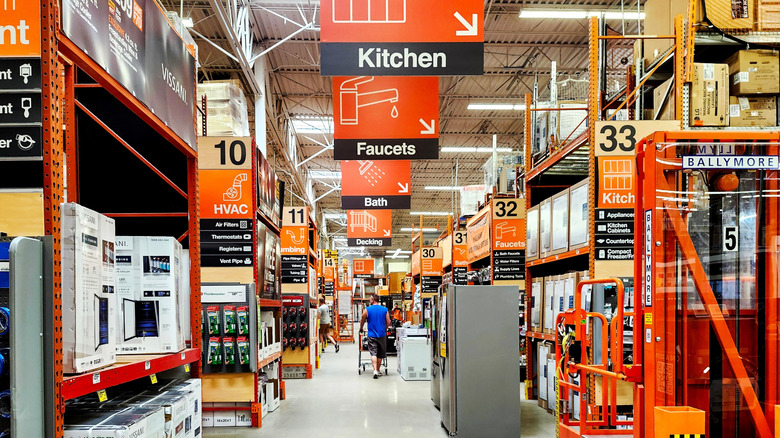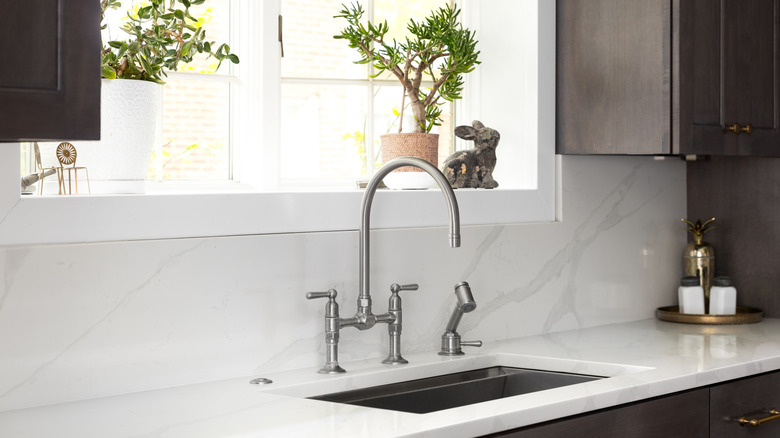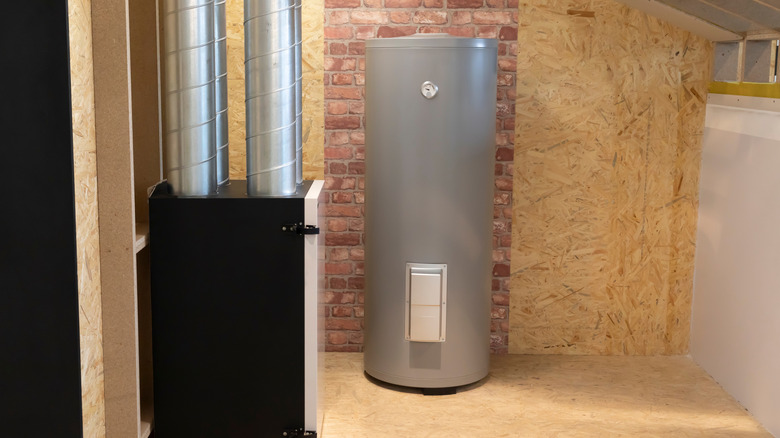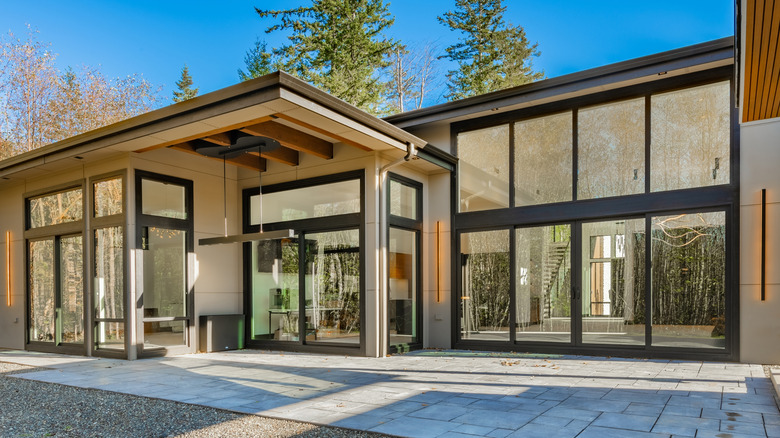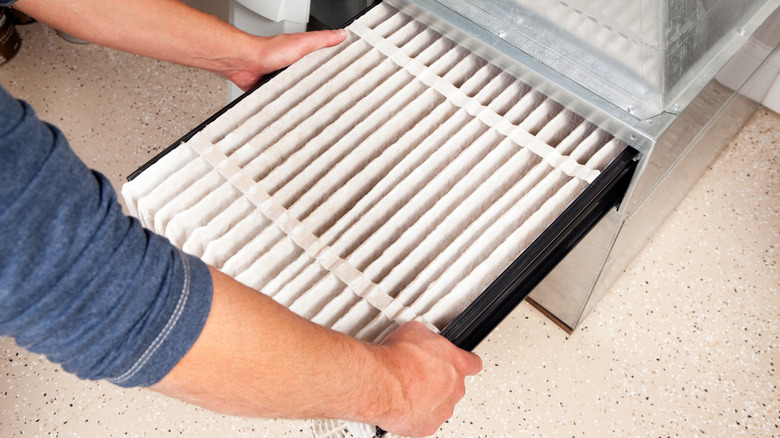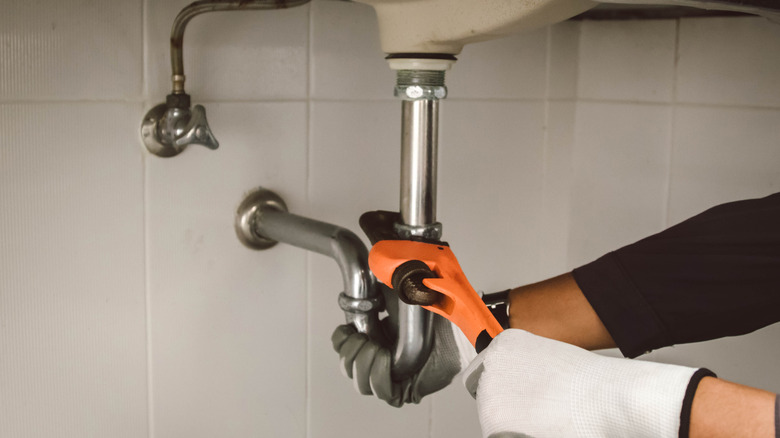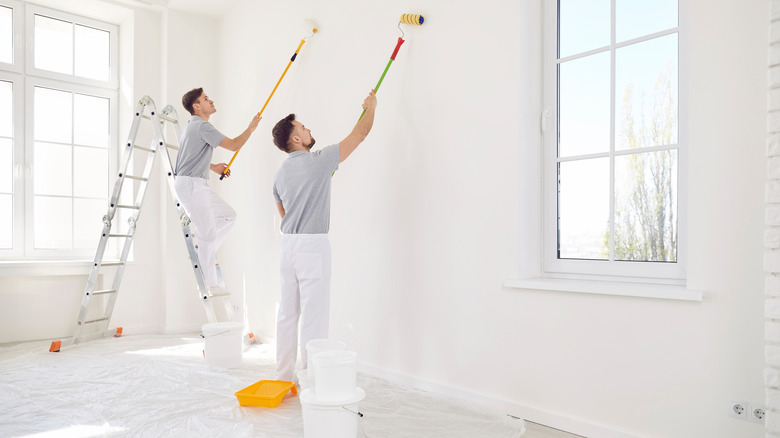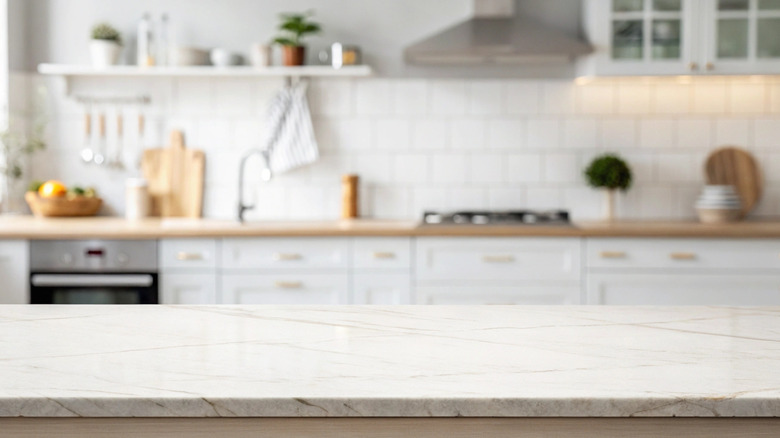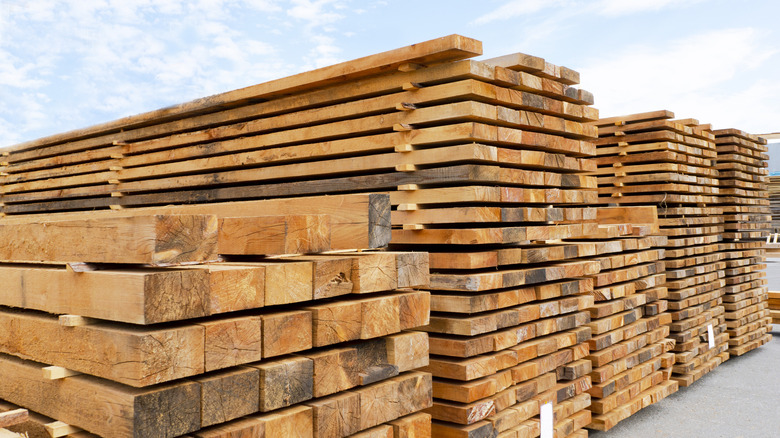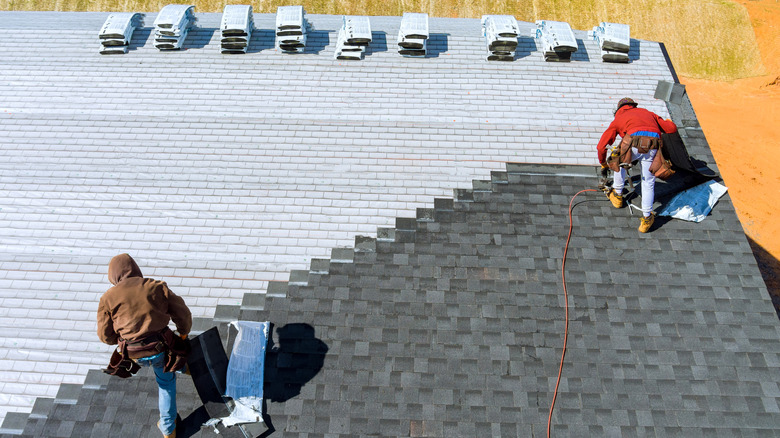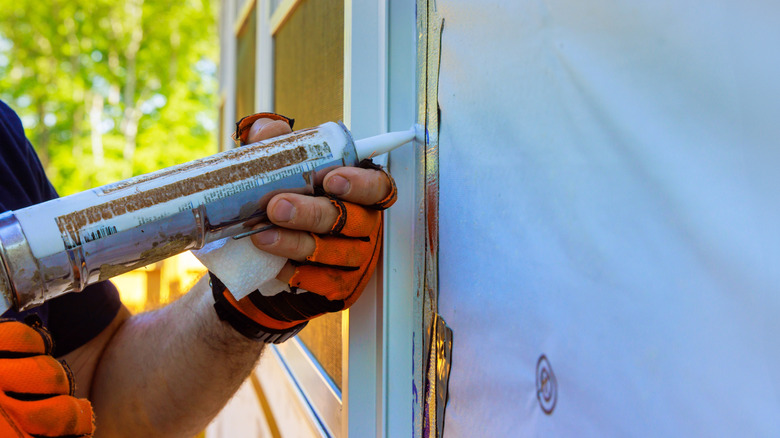Never Buy These Things At Home Depot
As the tagline suggests, Home Depot is a place that helps homeowners get things done. But that doesn't mean every weekend DIY renovation project should begin with a trip to the orange-hued retail corporation. While the popular chain is a great place to stock up on necessities like light fixtures, area rugs, tools, and gardening supplies at fairly affordable prices, it's not necessarily a one-stop shop for all your home improvement needs.
For instance, those looking to give their façade a facelift with doors, windows, and trim may be better served visiting a specialty store, while anyone hoping for a DIY garden glow-up might want to scout a local nursery for advice on the best greenery for their particular yard. And that's just the start of a growing list. In exclusive interviews, House Digest asked the experts what to avoid when scanning the big box store's plethora of aisles. Before you consult your to-do list, take note of their guidance.
Don't buy Home Depot's plumbing fixtures if you're looking for long-lasting options
Not all faucets are created equal. And due to Home Depot's practice of using white label products (where they take something manufactured by another company and rebrand it as their own), you could be flushing money down the drain if you opt for one of their fixtures. "These products may look the same visually," Gregg Cantor, president and CEO at Murray Lampert Design, Build, Remodel, explains to House Digest in an exclusive interview, "however, the quality is vastly different from those purchased at a contractor's wholesale supplier like Ferguson Enterprises."
Cantor continues, "The tradeoff is a much lower price at Home Depot for fixtures with lower build quality and different internal components with a significantly shorter lifespan." Plus, higher-end faucets can offer easy-use tools like voice activation, built-in water filters, and LED lights that change color based on water temps, making them a kitchen feature worth splurging on. To find the best faucet for your home, you'll want to consider the height, reach, style, metal finish, and various spray options.
The water heaters have shorter warranties than commercial-grade options
When it comes to choosing a water heater for your home, Cantor suggests you could end up in, well, hot water if you opt for Home Depot-branded water heaters. The difference between that and what you might find at a plumbing supply house, he says, are "smaller or single anode rods, thinner materials and shorter warranties than commercial grade water heaters."
Shopping the professional-grade wares at a specialty store like Winsupply, Ferguson, or Reese, will lead to higher quality, agrees Master Plumber Aaron Adams, CEO of Aaron Services, who is constantly telling his clients to steer clear of the water heaters at big box stores. "In general, retail models of water heaters are built at a lower cost, which means lower quality internal components and design," he tells House Digest in an exclusive interview. Among the drawbacks: "The boiler drain on a box store model, for example, is often plastic, which can easily break or leak," he says, while the walls are often thinner or poorly insulated. When you opt for a commercial-grade product, it tends to have a higher-quality anode rod, he explains, "Which means it won't wear away and need replacing as quickly." Bottom line, Adams adds, is that "water heaters from big box stores don't perform as well as professional-grade water heaters and don't last as long."
Don't buy replacement doors and windows at Home Depot if you want a quality installation
Yes, those deals on Home Depot's ready-made doors and windows look tempting, but Wes True, general manager and operations at Pella Windows & Doors of Omaha and Lincoln, warns they're usually not a good fit. Though they're made to work in most openings, he explains, very few places are actually designed with those square-shaped panes. And the so-called average sizes aren't all that prevalent. "I have witnessed customers fall for a deal that seems like hundreds less, only to end up spending hundreds more when alterations are necessary during installation," says True, noting you could be paying up for additional trim, or even a complete replacement "when the fit, thermal performance, and long-term durability aren't as good as they should be."
And not making those pricey alterations could be even more costly, with air leakage from a poor fit causing your energy bills to skyrocket. Instead of going for the seemingly inexpensive one-size-fits-some option, he recommends turning to an established local window dealer or custom millwork shop. They will "take measurements, build, and install doors and windows according to the master plan," he says. "That means a square frame, a tight seal, and materials made for your climate and intended use." While you'll spend more upfront, you can avoid any drafty gaps or potential leaks and, says True, "You will find that it requires less maintenance and provides more comfort, reducing the need for future repairs."
Home Depot thermostats are too basic for advanced furnace systems
When temps heat up, it's crucial for your home to keep its cool. And vice versa in the winter. If you have a fairly basic furnace, the thermostats on offer at Home Depot can definitely get the job done. But more sophisticated HVAC systems require a more sophisticated thermostat. Those who have a separate heating and cooling system, for instance, could require multiple thermostats. On the other hand, a zoned heating system, which changes the temperature in individual rooms, will likely need smart thermostats that can automatically adjust.
For those with a less-than-basic furnace, Jon Gilbertsen, HVAC contractor and president at Chris Heating & Cooling, recommends taking a more bespoke approach. As the Illinois-based expert explains in an exclusive interview with House Digest, "If your system is more advanced and has zoning, multi-stage, or special wiring, you need to get a thermostat from your HVAC tech so it works right."
Don't buy the Home Depot air filters if they aren't compatible with your HVAC system
The good news: Home Depot's selection of air filters includes ones with high Minimum Efficiency Reporting Value (MERV), meaning they promise to catch everything, from larger dust and pollen particles to even tiny viruses, and prevent them from passing through the filter and into the air stream. For reference, most homes can opt for a MERV 8 filter to catch dust and pollen. However, allergy sufferers, pet owners, and those with health complications will likely want to use filters with MERV ratings of 11 or 13. The idea of using a filter with a higher rating might sound great, Gilbertsen acknowledges, "but it's often bad for the system if you buy it without checking the compatibility."
So, before you snap up that filter, do a bit of homework. To see how high a MERV filter your HVAC can handle, consult your owner's manual. And keep in mind that filters come in a wide range of sizes. To make sure that you've got the right fit, check the dimensions in your HVAC system's manual or consult the manufacturer's website. You could also measure the opening yourself, being sure to grab the numbers for the length, width, and depth and rounding them up to the nearest half inch to ensure a snug fit.
The range of pipe fittings isn't broad enough for extensive or tricky plumbing projects
When your kitchen pipe randomly springs a leak, Home Depot is likely to have the fitting you need to patch things up. And, the retailer may be able to help you DIY a kitchen sink replacement or complete another simple project. However, assuming that they have the range of options necessary for a massive renovation or the restoration of an older home is somewhat of a, well, pipe dream. "But for a remodel or older plumbing, Home Depot won't have every fitting you need," explains Gilbertsen, "meaning you're chasing parts at other stores." Having to do that often requires cobbling together a hodge-podge of parts in a mix of metals like brass, copper, and steel, which can lead to corrosion down the line.
Save yourself from a rusty situation by starting bigger or more complicated projects at a plumbing supply house, recommends Gilbertsen. Not only will they likely have everything that you need to get the job done, he says, but there's a good chance it will be a higher quality metal. Plus, visiting these specialty retailers often means that you'll find employees with in-depth knowledge of plumbing projects that they can pass on to you.
Home Depot's hose bibs aren't high-quality
According to Gilbertsen, Home Depot's hose bibs (the outdoor water faucets that can be connected to a garden hose) don't really hold water. Metaphorically, anyway. Their collection of hose bibs tends to have thinner bodies and cheaper washers (the rubber piece that prevents water from leaking out). This means they're more likely to wear out quicker as they're exposed to extreme temps and other environmental hazards.
That's why this is another fixture best purchased at a plumbing supply store. There, says Gilbertsen, "you can get an option that will withstand freezing winter and years of use without causing you problems." One of the factors you'll want to consider is the weather in your area. Those who live in milder climates can get away with a more economical standard hose bib. However, if you endure harsh winters, you'll want a frost-free version that will prevent frozen or burst pipes. You'll also need to decide whether you prefer a more user-friendly quarter-turn handle or the precise control of a multi-turn, and in what material. While a plastic variety is often more affordable, you'll likely get more life out of stainless steel or brass.
Home Depot isn't the place to shop if you need expert paint advice
No shade to the actual paint selection at the retailer, which is actually pretty solid. However, Carr Lanphier, CEO of house painting service Improovy, exclusively tells House Digest that the convenience of buying paint at the store might not be worth it, especially if you need guidance. He explains, "Employees need to have a pretty broad base of knowledge, so in my experience, they're less likely to be paint experts."
Instead, he recommends sourcing your color of choice from paint-specific stores like Sherwin-Williams due to the employees on hand. He continues, "These stores are going to staff people who are knowledgeable about paint and house painting specifically, so in my experience, they're going to be better able to provide guidance and advice and steer you in the right direction if you have questions."
Of course, if you're the experienced type who spends most weekends finishing up yet another DIY project, you're likely to find what you need at the retail giant. And those that aren't seeking out a super-specific shade could benefit from buying Home Depot's discount paint selection on the so-called "oops shelf." Whether it's a gallon that didn't precisely match the tone the customer was after or just an order that wasn't picked up, these mixes sell for a steep discount. So, you may be able to snag a couple of gallons for the cost of a grande latte.
You're also unlikely to find the right shade for a historic renovation
Those looking to brush up their living room with their favorite soft gray hue or simply return a space to a crisp white can generally find what they need at Home Depot. But while the retailer has thousands of shades on offer, there are some limitations to their range. This is particularly true when it comes to tricky restoration work or refurbishing a historic home.
For historic renovations, Kevin J. Vander Hyde, vice president at Vander Hyde Services, prefers to frequent a Benjamin Moore dealer or another specialty paint store. There, they "can create custom colors," he tells House Digest in an exclusive interview, "and carry traditional finishes like milk paint or linseed oil-based products that weren't available at big box stores."
The employees are also more likely to have some expert tips about the work that goes into handling a historic building. For instance, you'll want to do a paint remover test to discover if you're working with latex or oil paint. Most products will be able to strip away latex, but not any and all oil-based varieties, and you'll need to use an alkyd oil-based primer designed to better penetrate into older wood.
The countertops are often overpriced
Whether you're in the market for quartz, granite, soapstone, or laminate, the various types of countertops you should be familiar with are a key ingredient in building out your dream kitchen. But even though there are many deals to be had at Home Depot, their pricing for counters actually can be topped. "You'd think that a big box store would make up for their lack of expertise and variety with lower prices, but you can find comparable pricing and a much better product, not to mention good advice and installation help, at countertop specialty outlets," Jonathan Palley, CEO at Clever Tiny Homes, tells House Digest in an exclusive interview.
And though it's tempting just to choose the kind you've had tacked to your Pinterest board for years, not considering the durability is a crucial mistake when choosing countertops. The lifespan of certain materials can give you a good idea of how durable it is. While laminate is easier on the wallet upfront, it's likely to last 30 years at the most. On the other hand, you're looking at a lifespan of up to 100 years out of a pricer natural stone like granite or quartz.
You can get better quality lumber from a lumber yard
Commenting on the lumber on offer at Home Depot, Samuel Khokhlan, owner at BlueChip Builders, gave it to us straight. "If your goal is to build a Gaudi-style curved wall, go ahead and buy your lumber from the Depot," he quipped, "but if you're trying to build a reliable, strong, straight wall — do yourself a favor and go shop at a local lumber yard." There, he says, you'll find top-notch quality at a comparable, or even cheaper, price, sometimes with the option of specifying your preferred grade (the ratings that indicate a board's quality, strength, and presence of defects like knots and splits).
However, Khokhlan can build a case for one specific brand. Burrill brand lumber isn't available at all 2,000-plus Home Depot locations, but if you can find these premium-grade products, "they're far superior," he insists, "for about $1 more per stud." Just be sure that you're selecting the right type of wood for your project. Hardwoods like maple, oak, mahogany, beech, and walnut are ideal for cabinets, flooring, fences, and decks, while softer woods (cedar, pine, fir, spruce) work best for ceilings, window frames, picture frames, and other DIY projects.
The roofing nails aren't always reliable and may rust prematurely
Home Depot doesn't quite nail it when it comes to their roofing nails. "The nails you find at big box retailers like Home Depot tend to vary in quality and consistency," Michael Feazel, CEO at Roof Maxx, tells House Digest in an exclusive interview. "I've seen nails with weak galvanization that rust prematurely or have heads that don't seat properly."
For a wider selection of more durable brands, he recommends checking out dedicated roofing retailers. ABC Supply and QXO (formerly Beacon Building Products) are two options to try. You'll want something that resists rust, like galvanized steel, stainless steel, or copper. Look for ones with ring shanks to keep shingles more securely in place, especially if you live in an area prone to high winds. The type of roof you're installing and the length of nails you need are other considerations. Specialty retailers often have knowledgeable employees who can help you navigate these factors.
Avoid the entry-level caulking and sealant products for key exterior areas
When you're sealing gaps around windows and doors or making roof repairs, you want something that's going to hold and handle all manner of extreme weather. Todd Stephenson, co-founder of Roof Quotes, has found Home Depot's roofing sealants and adhesives to be lacking in professional-grade durability. "I have tried some of their asphalt-based sealants," he tells House Digest in an exclusive interview, sharing that they "dry too fast when applied in the summer heat, causing early cracking." Feazel agrees that these products are more DIY-level quality, saying, "Home Depot carries some reputable brands, but the majority of their stock caulks and sealants are entry-level or general-purpose options."
When sealing around roof penetrations or windows, Feazel says his go-to is a durable NP1 sealant or OSI Quad Max. He also recommends sourcing these from a pro supply store. Stephenson agrees that a niche retailer is the way to go, saying, "A commercial supplier will carry better grade polyurethane or modified bitumen sealants that can remain flexible for years and will adhere to a wider variety of substrates."
Once you've chosen the correct caulk, be sure to avoid other no-nos when caulking your exterior doors and windows. This includes layering it over existing caulk or cutting off too much of the tip before you start, causing a too-thick line of caulk. You'll also want to make sure to regularly replace your caulk to keep your home protected from wind and rain.
